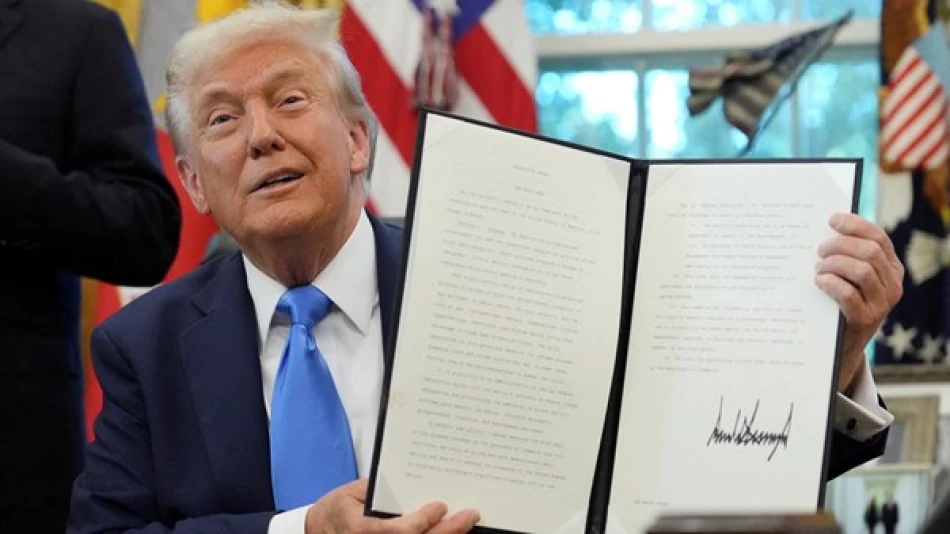
India Warns of Consequences as Trump Targets Tech Visa Fees
Trump's $100K H-1B Visa Fee Sparks India's Warning of Tech Industry Disruption
India has issued a sharp warning over President Donald Trump's announcement of a new $100,000 annual fee for H-1B work visas, effective immediately Sunday. The dramatic policy shift threatens to disrupt America's tech ecosystem, which relies heavily on skilled Asian professionals, while potentially reshaping global talent flows in the technology sector.
Immediate Implementation Catches Industry Off Guard
The Indian Ministry of Foreign Affairs condemned the abrupt timeline, warning that the measure could cause significant "disruptions" for families holding these specialized work permits. The one-day notice period has left companies scrambling to assess the financial impact of what amounts to a 10,000% increase in visa costs for many categories.
India's leading tech association NASSCOM expressed particular concern about project continuity, highlighting how the sudden implementation creates uncertainty for businesses, professionals, and students worldwide. The organization emphasized that policy changes of this magnitude typically require adequate transition periods to allow organizations and individuals to adapt effectively.
H-1B Visas: The Backbone of America's Tech Workforce
H-1B visas enable foreign nationals with specialized skills—including scientists, engineers, and computer programmers—to work in the United States. These permits initially last three years and can be extended to six years for workers sponsored by employers. Indian nationals have historically dominated H-1B approvals, representing roughly 70% of all recipients in recent years.
Financial Impact on Tech Giants
The new fee structure could fundamentally alter hiring strategies across Silicon Valley and beyond. Major technology companies that typically sponsor hundreds or thousands of H-1B workers annually now face potential costs reaching tens of millions of dollars. This financial burden may accelerate the trend of tech companies establishing larger operations in countries like India, Canada, and the UK to access skilled talent without visa restrictions.
Global Competition for Tech Talent Intensifies
Trump's move comes as countries worldwide compete aggressively for skilled technology workers. Canada's Express Entry system, the UK's Global Talent visa, and Singapore's Tech.Pass program have all been designed to attract the same pool of professionals that the US is now pricing out with prohibitive fees.
The timing is particularly significant given the artificial intelligence boom and the global shortage of specialized tech talent. Countries like the UAE and Germany have recently streamlined their visa processes specifically to capture workers who might face barriers entering the US market.
The Million-Dollar Golden Visa Alternative
Alongside the H-1B fee announcement, Trump signed an executive order creating a "golden" residence card priced at $1 million. This dual approach suggests a deliberate strategy to shift from employment-based immigration toward investment-based immigration, fundamentally changing America's approach to attracting foreign talent.
Speaking to reporters in the Oval Office, Trump emphasized the revenue potential: "The important thing is that we will welcome wonderful people who will come and pay." This transactional framing marks a departure from traditional immigration policy focused on economic contribution through work and innovation.
Market Implications and Industry Response
The policy shift could trigger several market responses. Indian IT services companies like Tata Consultancy Services, Infosys, and Wipro—which have traditionally relied on H-1B visas to deploy talent at US client sites—may need to restructure their business models toward remote delivery or higher-value services that justify the increased visa costs.
For US companies, the fee increase may accelerate automation initiatives and remote work arrangements, potentially reshaping how technology work is distributed globally. Startups and smaller tech companies, which often lack the resources to absorb such costs, may find themselves at a significant disadvantage in accessing international talent compared to larger corporations.
Long-term Consequences for US Competitiveness
This policy represents the most dramatic shift in skilled immigration costs in US history. While it may generate significant government revenue, economists warn it could undermine America's position as the global hub for technology innovation. The measure effectively creates a two-tiered system where only the wealthiest companies or individuals can access US opportunities, potentially driving innovation and entrepreneurship to more accessible markets.
The immediate implementation timeline suggests this is just the beginning of broader immigration policy changes, with implications extending far beyond the technology sector into healthcare, finance, and other industries dependent on skilled international workers.
Most Viewed News

 Layla Al Mansoori
Layla Al Mansoori






